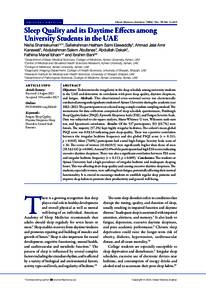Document
Sleep quality and its daytime effects among university students in the UAE.
Identifier
DOI 10.5001/omj.2024.61
Source
Oman Medical Journal, v. 39, no. 2, e604 p. [1-7].
Contributors
Kanawati, Ahmad Jalal Amir., Author
Abufanas, Abdulrahman Salem., Author
Dakak, Abdulilah., Author
Ibham, Fathima Manal., Author
Bani, Ibrahim., Author
Country
Oman
City
Muscat
Publisher
Oman Medical Specialty Board.
Gregorian
2024-03-01
Language
English
English abstract
Objectives: To determine the irregularity in the sleep schedule among university students
in the UAE and determine its correlation with poor sleep quality, daytime sleepiness,
and fatigue. Methods: This observational cross-sectional survey was electronically
conducted among undergraduate students of Ajman University during the academic year
2022–2023. The participants were selected using a simple random sampling method. The
instruments for data collection comprised of sleep schedule questionnaire, Pittsburgh
Sleep Quality Index (PSQI), Epworth Sleepiness Scale (ESS), and Fatigue Severity Scale.
Data was subjected to chi-square analysis, Mann-Whitney U test, Wilcoxon rank-sum
test, and Spearman’s correlation. Results: Of the 537 participants, 353 (65.7%) were
female. The majority (57.2%) kept highly irregular bedtimes. The cohort’s mean global
PSQI score was 8.9±3.0 indicating poor sleep quality. There was a positive correlation
between the irregular bedtime frequency and the global PSQI score (r = 0.311;
p 0.010). Most (70.8%) participants had a total high Fatigue Severity Scale score of
≥ 36. The scores of women (41.0±10.5) were significantly higher than those of men
(38.5±11.0) (p = 0.006). Around 53.0% of the participants had high ESS scores indicating
excessive daytime sleepiness. There was also a significant correlation between ESS score
and irregular bedtime frequency (r = 0.113; p = 0.009). Conclusions: The students at
Ajman University had a high prevalence of irregular bedtime and inadequate sleeping
hours. This was affecting their sleep quality and causing excessive daytime sleepiness. The
students, especially women, were suffering from fatigue, potentially affecting their normal
functionality. It is crucial to encourage students to establish regular sleep patterns and
improve sleep habits to promote their productivity and general well-being
ISSN
1999-768X (Print)
2070-5204 (Electronic)
Category
Journal articles

